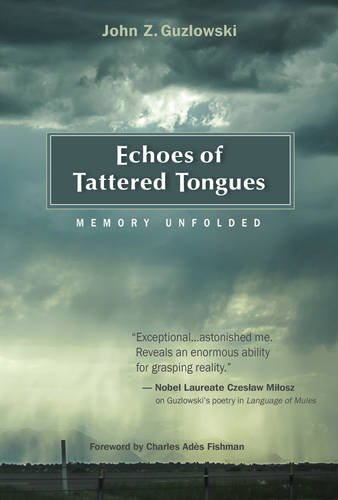Echoes of Tattered Tongues
by John Z. Guzlowski
reviewed by Okla Elliott
John Z. Guzlowski has been writing about his parents’ experiences during and after the Holocaust for years, working through the surface and subterranean hurts wrought by that calamitous world event upon a single family. Echoes of Tattered Tongues: Memory Unfolded should be read as a capstone project to Guzlowski’s years of processing this cultural and familial material.
The body of the book, after a brief introduction, is broken up into five parts—a preface, three “books,” and an epilogue—the classical structure for a drama. Each section of poetry is introduced by a prose section in a style that might be called “critical creative nonfiction.” These add much and detract nothing, despite the usual injunction against poets commenting on their own work; if anything, they enhance the memoir-like effect of the entire book and offer a theoretical context for the larger themes.
The preface is a poem titled “My People.” It has little to do with the Holocaust directly, but is rather about the Polish-immigrant experience and, perhaps, in a broader sense, about poverty.
My people were all poor people,
the ones who survived to look
in my eyes and touch my fingers
The poem speaks of deaths and, knowing the context, we might assume these are deaths that occurred during the Holocaust. But Guzlowski doesn’t mention Poland or concentration camps in the poem, instead using this preface to establish a wide conceptual background for a book that is at other times staggeringly intimate and specific to the experience of his family.
According to much research, trauma disrupts time and dislodges the self from linear experience, and it is interesting to note that Guzlowski does not organize the book in chronological order. The first full section is titled “Half a Century Later.” In other ways, too, the book is commendable for its psychological accuracy.
In the poem “My Parents Retire to Arizona,” the speaker describes the odd and useless items his parents want to give him:
They give us things we don’t want: blades
for hacksaws I don’t own, canna lily bulbs
in Ziploc bags even though I am death on them,
four cans of Comet cleanser
And the list goes on, subtly layering these useless gifts until the end of the poem, when the mother says, “Please take these things.” Then, finally, the speaker understands what the mother cannot say:
“Think of us as you use these things.
Once we were as young as you, cleaning
the house, dreaming over the backyard
of bright red lilies, counting these pennies.”
Echoes of Tattered Tongues is a formally coherent, challenging, and important book, chronicling the lasting scars of one family with deftness and narrative depth. Guzlowski is often bluntly direct, and occasionally lyrically oblique, but both to great effect. Emily Dickinson admonished poets to tell it slant, and Guzlowski certainly takes her advice, but he also sometimes ignores it in favor of Chekhov’s equally sage admonishment to tell the most monstrous events in the coldest and most direct fashion.
Published on September 8, 2016

